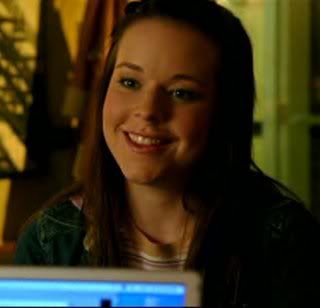I spent more time than I'd like to admit watching and re-watching that show (primarily when I was supposed to be spending time writing and re-writing a book....but that's another story), and somehow certain truths seeped through the spaces between memory montages and action scenes, and I actually learned a thing or two about the construction of fiction. Here is what I learned:
1. Let The Outsider Tell The Story - The reason why the show works so well in the first season (and then significantly less well in the second and third) is that our heroine is operating in a community sharply divided by class, wealth and race. Veronica, having lived on both sides of the wealth and power divide, finds herself rejected by both and belonging to neither.

2. Skillz. I can't stress this enough. Our characters (unlike certain cipher-like characters from various UNNAMED VAMPIRE BOOKS) are into stuff. They've got likes and dislikes and kinks and quirks and passions and hobbies, and all of these things come into play over the course of the story. Imagine Veronica without her signature camera. Imagine her not wanting to totally geek out over a bunch of stolen documents. Imagine her without that wicked intuition or that sensitivity to the depths of human nastiness and evil. You take those things away and you take away the character (not to mention about three quarters of the plot points). Your character has skills. Work 'em.
3. Posse. Not to get all Beatles-song on you people, but in the end, we all need a little help. And, as writers, we all remember what it's like being a loner - and worse feeling alone, but I think we do need to cut our characters a little bit of slack. Not only for their sake but for our reader's sake too. In the case of our Miss Veronica, she was more than happy to turn her back on everyone in her town, everyone in her school, everyone that had once been important to her, but every once in a while, righteous anger can spur us to action, which can make some unintentional friends along the way. Enter: Wallace.
 I mean, will you look at that kid? He's adorable. Not only that, but when it comes to fighting crime, finding lost mothers, avenging deaths and bringing down the establishment of wealth, power and privilege, you're gonna need some backup along the way. Give your character a friend - stalwart and true, and your character will get the job done.
I mean, will you look at that kid? He's adorable. Not only that, but when it comes to fighting crime, finding lost mothers, avenging deaths and bringing down the establishment of wealth, power and privilege, you're gonna need some backup along the way. Give your character a friend - stalwart and true, and your character will get the job done.And while we're on the subject, know what else your character needs? A geek.

Seriously, nothing says well-thought-out action and thorough research like a computer geek. Need to hack into the city government's mainframe? Call your geek-best-friend. Need to develop a virus that will not only incapacitate but humiliate your enemies as well? Call a cool geek. With a sense of humor.
4. Adults Exist. Look, I get it. I write YA (except when I don't) so the tendency is to write the adults out of the story. But let me ask you this: Are the adults written out of your story? Do teens only have conversations with other teens all the time? Of course not. As teens, our stories intersected with other teens, with adults (both relative and nonrelative) and with little kids. No one - except for the Children of the Corn - lives in an age-exclusive world. So for crying out loud, give your character at least one adult who can distinguish his head from a rock, who - while imperfectly - provide a little bit of support or guidance, and who might even be good for a joke or two.

And maybe it won't be quite as awesome as Everyone's Favorite Dad, Keith Mars, it'll be a start anyway.
Now I get it that this little tribute may come off as a little fan-girlish, and while some may look askance that I'm looking to television to inform my writing, I honestly don't care. I'm an unabashed fangirl, and to be completely honest, writing books is hard work. We need to find teachers in every medium we can find - books, professors, street performers, television shows, video games. Whatever. Find the thing that teaches you. And work those lessons like your life depended on it.







5 comments:
Great post, Kelly. I am a HUGE Veronica Mars fan, and I'm also a proponent of letting TV inform your writing.
Whenever I have a slow writing day and time allows, I'll watch Veronica. Or Firefly. Or the X-Files. Or 30 Rock. Characters, jokes, plotting, it's all laid out for you. Maybe I shouldn't admit it, but I can dig it.
Oooo! I love me some Firefly too! Perhaps that should be another post....
Awesome post! I miss Veronica Mars so much. I'm still keeping my fingers crossed that they'll make a movie. :)
Fangirl away! I'm a recent VM convert, and that show deserves every fangirl possible! When I finished the final season (*sniffles*), I even wrote a post about how it blew away all my expectations. No obligation, but if you're interested: http://www.firstnovelsclub.com/2010/09/open-apology-to-veronica-mars.html
Great post! I've never seen the show, as I am horrible about keeping up with TV, but I love the way you break down the crucial elements of character and story.
Post a Comment